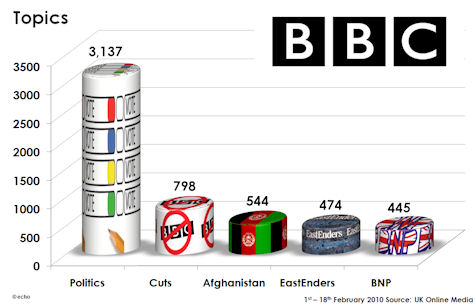PRmoment commissioned research to monitor how the BBC is covered in online media, taking a recent two-week period as a measure. This shows the corporation regularly causes debate, and the subject that taxes writers the most is the way it covers politics, as politics is always in the headlines.

Research supplied by Echo Sonar
Presently, the broadcaster is in the spotlight in the wake of director-general Mark
Thompson’s proposals for its restructure. Telegraph.co.uk wrote on 3 March: “The strategy review was billed as the biggest shake-up in 88 years of the BBC. It is an attempt to hush critics who claim the corporation has become too mighty.”
The proposals include scaling back the website, dropping digital radio stations, and focusing on creating new British programmes. But can this revamp silence those who complain that it is time the BBC’s licence fee is dropped? The BBC is also often criticised for the amount it pays its stars, and there are many who are pleased that Jonathan Ross’s salary will no longer be covered by licence-fee payers, as he is leaving in July after 13 years at the BBC.
Richard Griffiths, head of strategic media at PR firm Ketchum Pleon, believes that there are two challenges for the BBC if it wishes to generate good PR. First, it must overcome how slow it is at decision making. Second, it must deal with the largely hostile press from competitors like the Daily Mail and the Murdoch-owned media. Griffiths says: “Rightly or wrongly, the BBC’s recent refusal to disclose individual stars' salaries suggests a lack of transparency – a particular challenge when licence-fee payers are paying the bills. Being seen as transparent and open is critical for any organisation in building and maintaining its reputation.”
Another problem for the BBC is that because of its sheer size and diversity, it can be hard to define what it does best. Tom Leatherbarrrow, head of business to business at Willoughby PR, believes that the BBC is in trouble, in large part because it does not know what it is. Leatherbarrow asks: “Is it a populist broadcaster producing programmes like 'Help Me Anthea, I'm Infested" going head to head with ITV and BSkyB, or is it a state-owned public broadcaster which should concentrate on quality educational and informative programming?”
Leatherbarrow claims that this lack of clarity is producing many PR gaffes. He
explains: “witness the Panorama Ryanair programme which managed to do the almost impossible by making Michael O'Leary look sympathetic. Or alternatively, the deliberate scheduling of Strictly Come Dancing against X-Factor which begged the question, is it the role of a subsidised state broadcaster to deliberately try and reduce the audience figures and, crucially advertising revenues, for a commercial broadcaster?
“The BBC is worth saving, but it needs to reform itself and no amount of positive PR is going to solve this central problem."
PRmoment asked Echo Sonar to analyse all UK online media coverage of the BBC. The research period was 1 February to 18 February 2010. Metrics included daily trend and topics.
PR Masterclass: The Intersection of PR and GEO
Wednesday 25th February, both virtual and in person tickets are available.
PR MasterclassIf you enjoyed this article, sign up for free to our twice weekly editorial alert.
We have six email alerts in total - covering ESG, internal comms, PR jobs and events. Enter your email address below to find out more:








